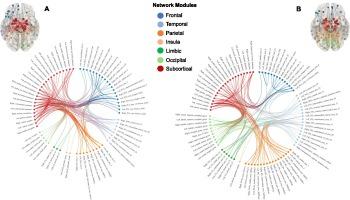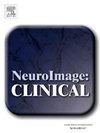兴奋剂使用障碍患者基于价值的选择和结果的大脑连接性降低。
IF 3.4
2区 医学
Q2 NEUROIMAGING
引用次数: 0
摘要
背景:兴奋剂使用障碍(SUD)患者在做出基于价值的选择时会出现障碍,这与大脑网络神经处理过程的紊乱有关。做出最佳选择需要从结果中学习,以更新知识并进一步优化当前行为。支持做出有利选择能力的神经系统的最佳功能是生活功能和 SUD 患者成功康复的重要组成部分。因此,我们试图研究支持 SUD 患者基于价值做出选择的神经过程。我们假设,SDD 患者在概率强化学习任务中做出财务选择时,其功能连接性会降低:方法:我们在一项药理学磁共振成像研究中调查了 SUD 患者和健康对照组参与者与基于损失和奖励的价值选择及其结果相关的连接性。在随机、双盲、安慰剂对照、平衡、交叉设计中,参与者接受了单剂量的多巴胺受体激动剂普拉克索和多巴胺受体拮抗剂阿米舒必利。采用全脑连接组学方法分析了与任务相关的功能连接,以确定受多巴胺能受体功能调节的网络:结果:SUD 患者在基于奖赏和损失价值的选择和结果过程中表现出广泛的连接性降低,这与使用兴奋剂的持续时间呈负相关。氨磺必利和普拉克索均不能急性调节SUD患者在完成任务时大脑功能连接的紊乱:结论:大脑连通性的降低,尤其是在做出基于价值的选择和处理结果时,可能是SDD患者学习障碍的原因。鉴于急性多巴胺能调节并不能改善药物依赖性障碍患者的大脑连通性损伤,因此可能需要其他治疗方法。本文章由计算机程序翻译,如有差异,请以英文原文为准。

Reduced brain connectivity underlying value-based choices and outcomes in stimulant use disorder
BACKGROUND: Patients with stimulant use disorder (SUD) show impairments when making value-based choices that are associated with disruptions in neural processing across brain networks. Making optimal choices requires learning from outcomes to update knowledge and further optimise ongoing behaviour. The optimal functioning of neural systems that underpin the ability to make favourable choices is an essential component for life functioning, and successful recovery in patients with SUD. Therefore, we sought to investigate the neural processes that underpin value-based choices in SUD patients. We hypothesise that patients with SUD have reduced functional connectivity while making financial choices during a probabilistic reinforcement learning task. METHODS: We investigated connectivity associated with loss and reward value-based choices and their outcomes in patients with SUD and healthy control participants during a pharmacological magnetic resonance imaging study. Participants received a single dose of a dopamine receptor agonist, pramipexole, and a dopamine receptor antagonist, amisulpride, in a randomised, double-blind, placebo-controlled, balanced, crossover design. Functional task-related connectivity was analysed taking a whole brain connectomics approach to identify networks that are differentially modulated by dopaminergic receptor functioning. RESULTS: SUD patients showed widespread reductions in connectivity during both reward and loss value-based choices and outcomes, which were negatively correlated with the duration of stimulant drug use. Disturbances to functional brain connectivity in SUD patients during task performance were not modulated acutely by either amisulpride or pramipexole. CONCLUSIONS: Reductions in brain connectivity, particularly when making value-based choices and processing outcomes, may underlie learning impairments in SUD patients. Given that acute dopaminergic modulation did not improve brain connectivity impairments in SUD patients, it is likely that alternative treatments are needed.
求助全文
通过发布文献求助,成功后即可免费获取论文全文。
去求助
来源期刊

Neuroimage-Clinical
NEUROIMAGING-
CiteScore
7.50
自引率
4.80%
发文量
368
审稿时长
52 days
期刊介绍:
NeuroImage: Clinical, a journal of diseases, disorders and syndromes involving the Nervous System, provides a vehicle for communicating important advances in the study of abnormal structure-function relationships of the human nervous system based on imaging.
The focus of NeuroImage: Clinical is on defining changes to the brain associated with primary neurologic and psychiatric diseases and disorders of the nervous system as well as behavioral syndromes and developmental conditions. The main criterion for judging papers is the extent of scientific advancement in the understanding of the pathophysiologic mechanisms of diseases and disorders, in identification of functional models that link clinical signs and symptoms with brain function and in the creation of image based tools applicable to a broad range of clinical needs including diagnosis, monitoring and tracking of illness, predicting therapeutic response and development of new treatments. Papers dealing with structure and function in animal models will also be considered if they reveal mechanisms that can be readily translated to human conditions.
 求助内容:
求助内容: 应助结果提醒方式:
应助结果提醒方式:


